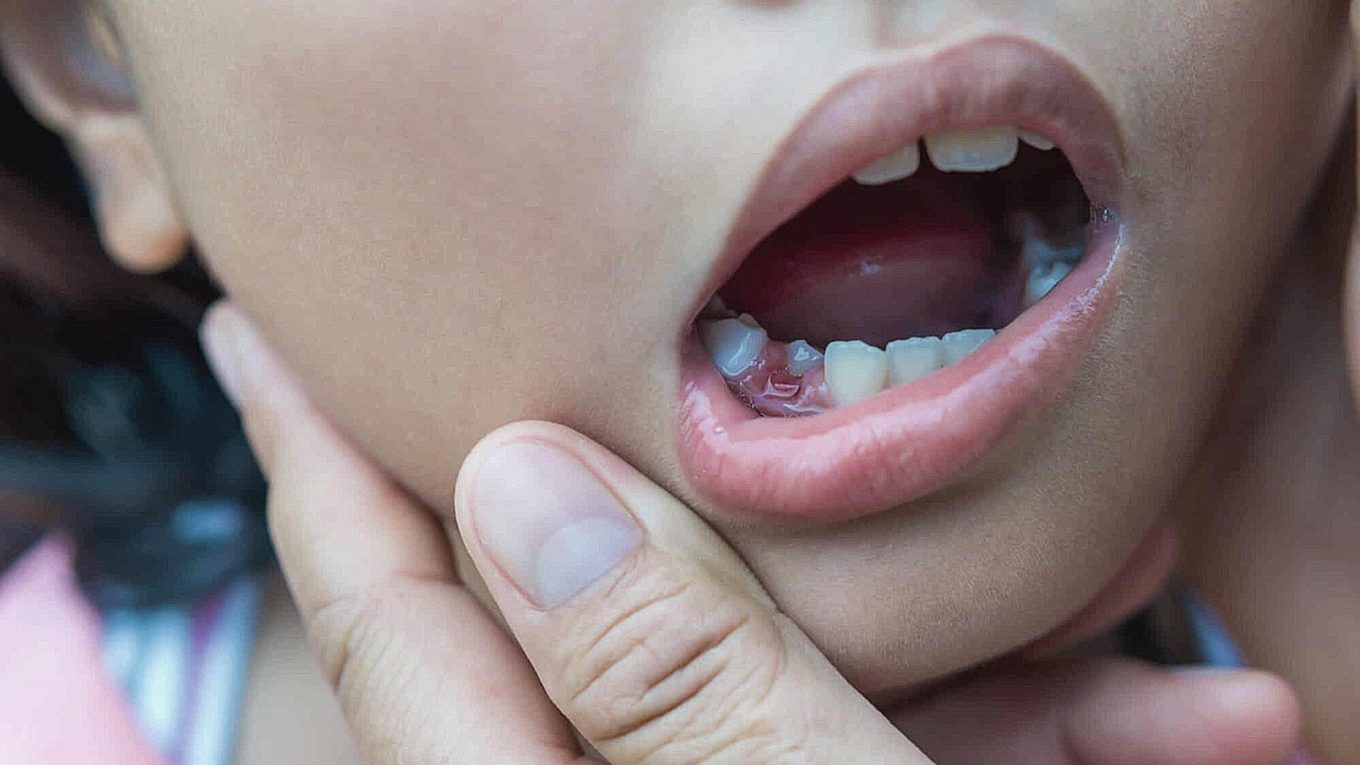Can Frenchies lose teeth at 5 months?
Ever wondered if those irresistible French Bulldogs, with their adorable bat-like ears, go through the same toothy escapades as other pups? Today, we’re diving headfirst into the captivating world of Frenchies losing teeth at a mere 5 months old.
Imagine this: those cute, droopy faces adorned with a set of teeny-tiny chompers that seem to vanish almost as quickly as they appeared. It might sound surprising, but guess what? The tooth fairy isn’t just fluttering around children’s bedrooms; she’s also making magical stops for our beloved Frenchies.
Come along on this enchanting journey as we uncover the wiggly adventures of these pint-sized pooches shedding their baby teeth, unveiling their grown-up canines, and embracing their adult doggy smiles. So sit back, relax, and prepare to be amazed by the toothless wonders that await our French Bulldog friends.
Can Frenchies lose teeth at 5 months
Contents
- 1 Can Frenchies lose teeth at 5 months
- 2 When Do Frenchies Start Losing Their Baby Teeth?
- 3 How Can You Tell If Your Frenchie Is Losing Teeth?
- 4 What Should You Do If Your Frenchie Is Losing Teeth?
- 5 Are There Any Complications That Can Occur During the Teething Process?
- 6 What Are Some Signs That a Frenchie Is Experiencing Discomfort or Pain During the Teething Process?
- 7 What Can You Do to Help Alleviate Discomfort or Pain During the Teething Process?
- 8 How Important is Regular Dental Care for French Bulldogs During the Teething Process?
- 9 How Can Owners Monitor Their French Bulldog’s Progress During the Teething Process?
- 10 Conclusion
With their adorable wrinkles and playful personalities, they steal our hearts without even trying. But as responsible Frenchie parents, it’s important to stay informed about their health and development. One question that often pops up is, can Frenchies lose teeth at 5 months? Well, my fellow Frenchie enthusiasts, let me enlighten you.
The Teething Process: A Rite of Passage for Frenchie Pups
Just like human babies, French Bulldogs go through a teething process where their baby teeth fall out to make room for their adult chompers. This transformative journey usually begins around 4-5 months of age and can continue until they are around 6 months old. So yes, losing teeth at 5 months is perfectly normal for your Frenchie furball.
Why the Pearly Whites Go Missing
During the teething process, those tiny baby teeth start to wiggle and jiggle, eventually giving way to the larger and stronger adult teeth. It’s nature’s way of ensuring that your Frenchie can tear into their chew toys and gobble up those treats with ease.
Watch Out for the Signs
As your Frenchie’s baby teeth loosen, you may notice increased chewing behavior. Hey, don’t worry, they’re not trying to destroy your favorite shoes (well, maybe a little), but rather trying to alleviate the discomfort caused by teething. Keep an eye out for drooling and maybe even a hint of blood from their gums as those pearly whites make their grand exit.
Maintaining Good Oral Hygiene: The Key to a Dazzling Smile
Now, while losing baby teeth is a natural part of your Frenchie’s development, it’s crucial to keep their oral hygiene in check during this time. Regular brushing of their teeth using doggy toothpaste and providing them with dental chews or treats specifically designed for puppies can help keep their gums healthy and prevent any potential dental issues. Let’s make sure those smiles stay as bright as the Eiffel Tower lights.
When to Seek Professional Help
In most cases, the teething process goes smoothly for our Frenchies. However, sometimes, those stubborn baby teeth refuse to budge. If you notice any retained baby teeth, it’s best to consult with a veterinarian. They can assess your Frenchie’s oral health and may need to remove the retained teeth to prevent future dental problems.
When Do Frenchies Start Losing Their Baby Teeth?
From their adorable little noses to their wiggly tails, French Bulldogs are the epitome of cuteness. But did you know that just like human babies, these sweet furballs also go through a teething phase? That’s right. Let’s sink our teeth into the facts and uncover when Frenchies start losing their baby teeth.
Teething typically begins around 4 to 6 months of age for French Bulldogs. During this period, your Frenchie’s gums may become sore and swollen, causing them to chew on anything they can get their paws on. It’s their way of alleviating the discomfort and soothing their gums. So don’t be surprised if you find your Frenchie gnawing on your favorite pair of slippers or even your furniture.
The teething process usually starts with the incisors, which are the small front teeth, followed by the canines and premolars. However, it’s important to note that the order in which the teeth fall out may vary from dog to dog. So don’t panic if your Frenchie’s teeth don’t follow the textbook sequence.
To help your Frenchie through this uncomfortable phase, provide them with appropriate chew toys. These toys not only give them something safe to chew on but also help redirect their chewing behavior away from your belongings. Look for toys specifically designed for teething puppies, as they are softer and gentler on their delicate gums.
While your Frenchie is losing their baby teeth, it’s crucial to keep an eye on their oral health. The teething process can make them more prone to dental issues such as plaque buildup and gum inflammation. To maintain good oral hygiene, make sure to brush your Frenchie’s teeth regularly with doggy toothpaste. This will help remove any food particles or bacteria that could potentially lead to dental problems.
If you notice excessive bleeding, persistent pain, or any unusual behavior during your Frenchie’s teething phase, it’s best to consult with a veterinarian. They can provide proper guidance and advice to ensure your Frenchie’s oral health is in tip-top shape.
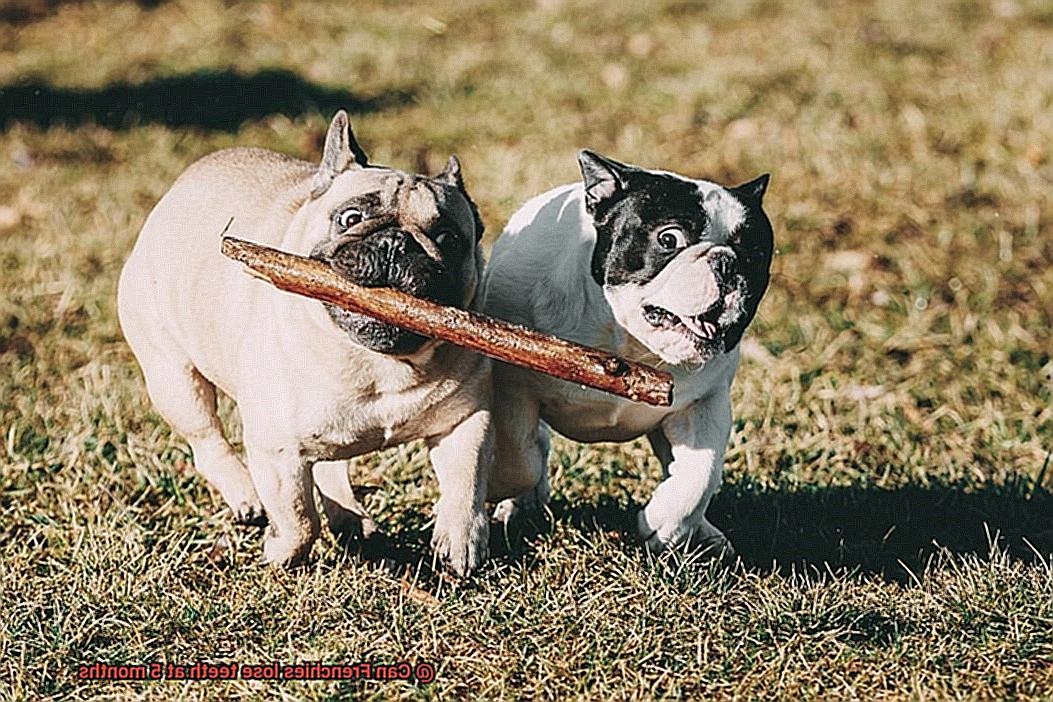
How Can You Tell If Your Frenchie Is Losing Teeth?
Just like human babies, Frenchies also go through a teething phase where their baby teeth are replaced by permanent adult teeth. As a responsible Frenchie owner, it’s important to know how to tell if your furry friend is losing teeth and how you can help them through this process.
- Look for Baby Teeth: One of the first signs that your Frenchie is losing teeth is finding small, sharp baby teeth around the house. These teeth may be slightly bloody or have a pinkish coloration due to the gum bleeding during the teething process. Keep an eye out for these tiny treasures.
- Increased Chewing Behavior: Teething can cause discomfort, and your Frenchie may start chewing on toys, furniture, or even your fingers more frequently as they try to alleviate the soreness in their gums. Providing them with appropriate chew toys can help satisfy their urge to chew while protecting your belongings.
- Red and Swollen Gums: Another sign to look out for is red and swollen gums. This is a common sign of teething in French Bulldogs and can be accompanied by increased drooling or even bad breath. It’s essential to keep an eye on their oral health during this time.
- Monitor Eating Habits: Changes in appetite or difficulty eating can indicate dental problems associated with teething. If you notice any significant changes in your Frenchie’s eating habits, it’s important to consult with your veterinarian for proper evaluation and treatment.
- Provide Teething Relief: To help your Frenchie through the teething process, provide them with appropriate chew toys specifically designed for teething puppies. These toys can help soothe their gums and satisfy their urge to chew. Avoid giving them hard objects that could damage their teeth.
- Maintain Good Oral Hygiene: It’s crucial to maintain good oral hygiene during the teething process. Gently brushing your Frenchie’s teeth with a dog-specific toothbrush and toothpaste can help prevent dental issues as their adult teeth come in. This practice should be continued throughout their life to ensure healthy teeth and gums.
Remember, while some discomfort during teething is normal, excessive pain or bleeding should be brought to the attention of a veterinarian. They can provide guidance and recommend appropriate treatments if necessary.
What Should You Do If Your Frenchie Is Losing Teeth?
This is a normal part of their development, and I’m here to help guide you through it.
- Keep an Eye Out for Baby Teeth: Frenchies, just like human babies, go through a teething process where their baby teeth fall out and are replaced by adult teeth. Around 4-6 months of age, you may start finding little baby teeth around your house. It’s like finding a tiny treasure. Keep these as a memento or throw them away if it weirds you out.
- Provide Chew Toys: Teething can be uncomfortable for puppies, and they may chew more frequently to relieve the discomfort. Make sure to provide your Frenchie with appropriate chew toys to satisfy their urge to chew and protect your belongings. Look for chew toys that are specifically designed for teething puppies, made of soft rubber or fabric that is gentle on their gums.
- Try Freezing Chew Toys: To give your Frenchie some extra relief, try freezing their chew toys before giving them to your pup. The cold sensation can provide additional comfort for their sore gums. Just make sure not to freeze anything too hard that could damage their teeth.
- Feed a Dental Health Diet: Good dental health starts from within. Opt for dry kibble instead of wet food, as the crunchy texture of dry kibble can help clean their teeth and massage their gums. You can also add some dental treats or chews to their diet. These treats are specially formulated to promote dental health by reducing plaque and tartar buildup.
- Consult with Your Veterinarian: If your Frenchie seems to be in significant discomfort or is not eating well due to teething, it’s essential to consult with your veterinarian. They can provide advice on pain relief options or recommend dental care products suitable for your Frenchie’s needs. Your vet is like the MVP of your Frenchie’s health team, so don’t hesitate to reach out.
Are There Any Complications That Can Occur During the Teething Process?
It’s an exciting time as your furry friend transitions from adorable little puppy teeth to their strong and mighty adult chompers. But hold on, folks, because there can be some complications that arise during this teething adventure. Let’s dive right in and explore what these potential pitfalls are and how you can navigate them like a pro.
- RETAINED BABY TEETH: Picture this – your French Bulldog’s adult teeth start coming in, but those baby teeth just won’t budge. This is known as retained baby teeth, and it can cause overcrowding and misalignment of the adult teeth. To prevent future dental issues, make sure to have your veterinarian check your pup’s teeth regularly during the teething process.
- GUM INFLAMMATION OR GINGIVITIS: As those new adult teeth push through the gums, they can cause irritation and inflammation. Ouch. Keep an eye out for red, swollen gums or even a bit of bleeding. To ease your French Bulldog’s discomfort, try gently massaging their gums with a soft toothbrush or a puppy-friendly teething toy.
- INAPPROPRIATE CHEWING: Ah, the urge to chew. It’s strong during the teething phase, and if your Frenchie doesn’t have appropriate chew toys, they might turn their attention to your favorite pair of shoes or that lovely antique chair. Yikes. To save your belongings from destruction, provide your pup with durable yet gentle chew toys designed specifically for teething puppies.
- DECREASED APPETITE: The pressure on their gums while chewing can cause soreness, leading to a decrease in appetite or reluctance to eat. Keep a close eye on their food intake and consider offering softer or wet food options that are easier to consume. And don’t forget to keep them hydrated with fresh water at all times.
- MILD BEHAVIORAL CHANGES: Teething can be a bit uncomfortable, and sometimes our furry friends show it through mild behavioral changes. They might become a little more irritable or have a penchant for chewing on things they shouldn’t. Stay patient, my friend, and provide plenty of positive reinforcement for appropriate behavior. Consistent training and redirecting their attention to appropriate chew toys can work wonders.
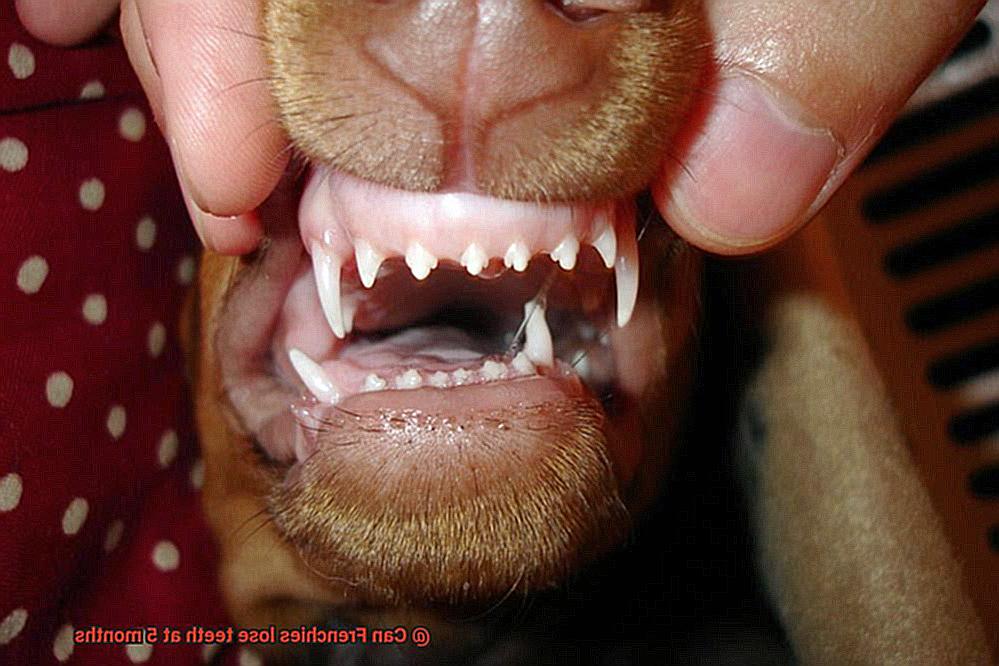
What Are Some Signs That a Frenchie Is Experiencing Discomfort or Pain During the Teething Process?
Here are some signs that your Frenchie is experiencing discomfort or pain during the teething process. Pay attention to these clues so you can help your furry friend through this challenging phase:
- Excessive drooling: If you notice your Frenchie has turned into a drool machine, it could be a sign of teething discomfort. The increased saliva production helps to soothe their irritated gums, but too much drooling can be a clear indicator that they’re in pain.
- Chewing and biting: Frenchies, just like puppies in general, may resort to chewing and biting on objects to alleviate the discomfort caused by teething. They’ll gnaw on anything from toys to furniture, and even your precious hands and feet. Keep an eye out for excessive chewing or biting as it’s a telltale sign that they’re trying to find relief for their sore gums.
- Loss of appetite: Teething can make chewing on food a painful experience for your Frenchie, leading them to lose interest in their meals. If your pup suddenly becomes uninterested in eating, it’s likely due to teething discomfort.
- Irritability and restlessness: Imagine having sharp teeth pushing through your gums – it’s enough to make anyone irritable and restless. Your Frenchie may become more agitated than usual and have difficulty settling down during this teething phase. If you notice them being more irritable or restless than usual, it’s a good indication that they’re experiencing pain.
- Bleeding gums: As new teeth come in, it’s not uncommon for your Frenchie’s gums to bleed slightly. You may notice pink or red spots on their toys or chew bones. While a little bleeding is normal, keep an eye on it and consult with a vet if the bleeding persists or worsens.
- Pawing at the mouth: Some French Bulldogs may paw at their mouths or rub their faces against furniture or the floor in an effort to alleviate gum discomfort. If you catch your Frenchie engaging in this behavior, it’s a clear sign that they’re experiencing pain or discomfort during the teething process.

What Can You Do to Help Alleviate Discomfort or Pain During the Teething Process?
With the right strategies, you can help alleviate discomfort and pain during this phase. In this blog post, we will explore seven effective methods to soothe your Frenchie’s teething woes and make the process easier for everyone involved.
Provide appropriate chew toys:
Chew toys are a teething Frenchie’s best friend. Look for toys specifically designed for teething puppies, such as rubber or nylon toys that can be frozen. The cold temperature provides relief to inflamed gums and helps soothe discomfort.
Use teething gels or sprays:
Teething gels or sprays can be a handy tool in providing temporary relief. These products often contain mild anesthetics or natural soothing agents that are safe for puppies. Remember to consult with your veterinarian before using any product to ensure its safety and effectiveness.
Frozen treats:
Who doesn’t love a tasty treat? Offer your Frenchie frozen treats like a wet washcloth or low-sodium broth ice cubes. The coolness helps numb their gums while providing a delicious distraction from the discomfort.
Gentle gum massage:
A little TLC goes a long way. Gently massaging your Frenchie’s gums with clean fingers or a soft toothbrush can alleviate discomfort and promote healthy gum development. Use gentle circular motions and avoid applying too much pressure on their sensitive gums.
Regular dental care:
Maintaining good oral hygiene is crucial during teething. Brush your Frenchie’s teeth regularly with dog-friendly toothpaste and a toothbrush designed for their size. This practice helps prevent plaque buildup and reduces gum inflammation.
Distraction and playtime:
Keep those paws busy. Engage your teething Frenchie in fun and interactive playtime to divert their attention from the discomfort. Provide them with plenty of toys and activities that mentally and physically stimulate them. This not only distracts them from the pain but also helps wear down their baby teeth naturally.
Patience and understanding:
Above all, be patient and understanding during this challenging phase. Teething is a natural process, and your Frenchie may exhibit certain behaviors due to discomfort. Provide extra love, comfort, and attention to help them feel secure and alleviate any anxiety they may experience.
How Important is Regular Dental Care for French Bulldogs During the Teething Process?
It’s that time when our adorable French Bulldogs transform into little chewing machines. But did you know that regular dental care during this stage is crucial for their oral health? In this blog post, we’ll dive into the importance of dental care for French Bulldogs during the teething process and provide you with expert tips to make it a breeze. So, grab a cup of coffee and let’s get started.
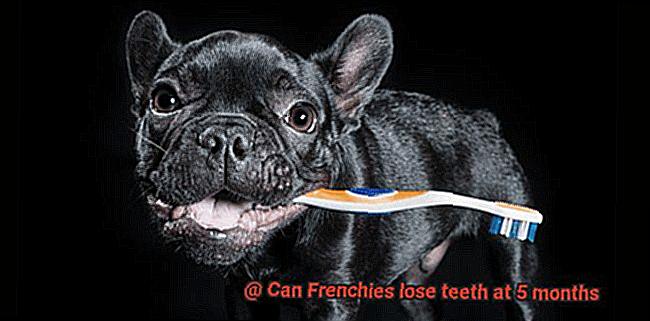
Say Goodbye to Baby Teeth:
Between 3 to 7 months of age, your Frenchie will start losing their baby teeth and welcoming their permanent ones. Regular dental care during this time ensures proper oral health and prevents future dental issues.
Alleviate Their Discomfort:
Teething can be a painful process for our furry friends. By providing them with appropriate dental care, such as regular brushing with dog-friendly toothpaste and toothbrush, we can help alleviate their discomfort.
Early Introduction = Lifelong Benefits:
Introducing dental care early on in your Frenchie’s life helps them get used to the process. This makes it easier to maintain good oral hygiene as they grow older. Plus, who doesn’t love a dog with pearly whites?
Chew Toys to the Rescue:
Chew toys are a teething Frenchie’s best friend. They not only relieve discomfort but also encourage healthy chewing behavior and aid in the removal of loose baby teeth.
Vet Check-ups are a Must:
Regular dental check-ups with your veterinarian are essential during the teething process. They can identify any potential issues and provide necessary treatments or recommendations to keep your Frenchie’s teeth in tip-top shape.
The Consequences of Neglect:
Neglecting regular dental care during teething can lead to gum disease, tooth decay, and misaligned teeth in French Bulldogs. Let’s prevent these issues before they occur.
Set the Foundation for a Lifetime:
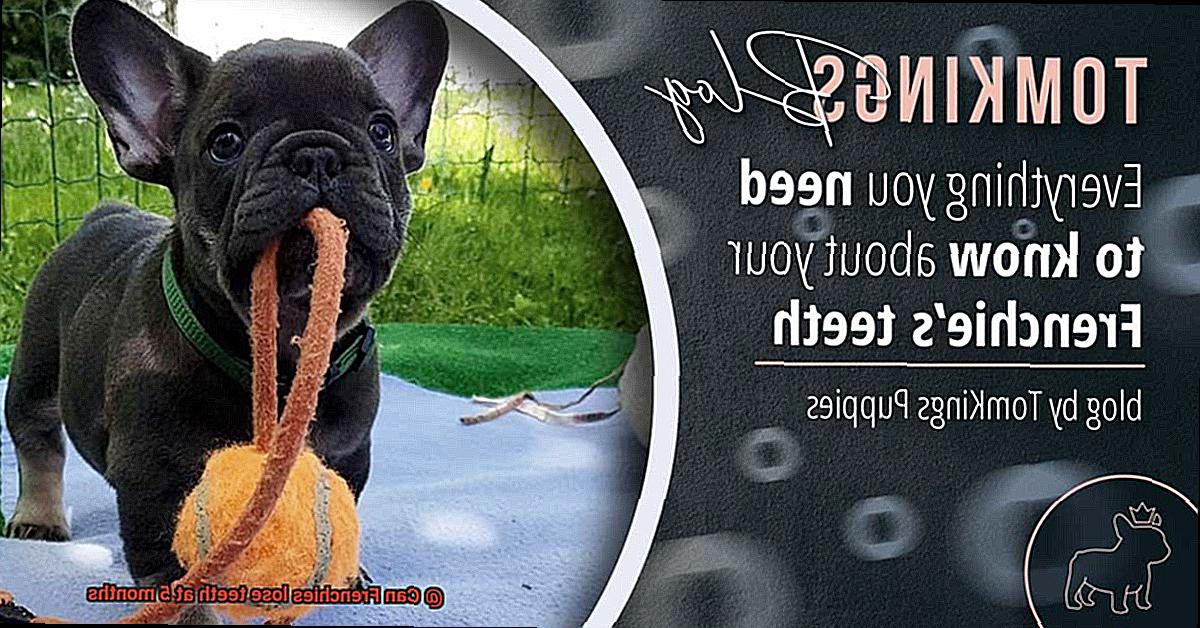
Good oral hygiene during teething sets the foundation for a lifetime of healthy teeth and gums in French Bulldogs. It prevents dental problems in adulthood, which can cause pain, difficulty eating, and impact overall health.
How Can Owners Monitor Their French Bulldog’s Progress During the Teething Process?
With a few simple steps, you can monitor your pup’s teething progress and ensure they have a comfortable journey into adulthood. So, grab your pup’s favorite toy and let’s get started.
Increased Chewing Behavior:
During the teething process, your Frenchie may turn into a chewing machine. Keep an eye out for increased chewing on toys, furniture, or even their own paws. Redirect this behavior by providing appropriate chew toys and bones, saving your precious belongings from destruction.
Check the Mouth Regularly:
Gently lift your Frenchie’s lips and take a peek into their mouth. Look for any loose or missing teeth and make sure the new ones are coming in correctly. Some bleeding or swelling of the gums is normal during teething, but excessive bleeding or signs of infection should be addressed by a veterinarian.
Appetite Changes:
Teething can cause discomfort, leading to a decrease in appetite for some pups. Others may find solace in chewing and have an increased appetite. Ensure your Frenchie maintains a healthy diet by softening dry kibble with warm water or providing wet food if necessary.
Regular Dental Care:
Just like humans, French Bulldogs need proper dental care during teething. Continue brushing their teeth with a dog-friendly toothpaste and toothbrush to prevent plaque buildup and future dental issues. This habit will set them up for a lifetime of good oral health.
Lots of Love and Patience:
Teething can be uncomfortable for your furry friend. Shower them with love, comfort, and patience during this stage. They may seek extra attention from you, so be prepared for some extra cuddles and playtime.
Conclusion
French Bulldogs, like any other breed of dog, can indeed lose their baby teeth around 5 months of age.
It’s a natural part of their development and is necessary for the growth of their adult teeth. Just like human babies, Frenchies go through a teething process that can be uncomfortable and even painful at times.
During this time, you may notice your Frenchie chewing on objects more often or experiencing swollen gums. It’s important to provide them with appropriate chew toys to alleviate their discomfort and protect your furniture from becoming casualties of their teething frenzy.
Remember to keep an eye out for any signs of excessive bleeding or persistent pain, as these could indicate a dental issue that requires veterinary attention.
